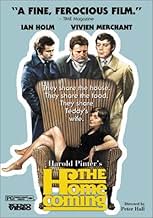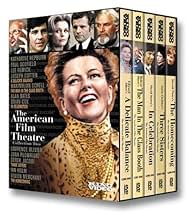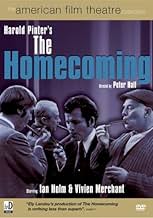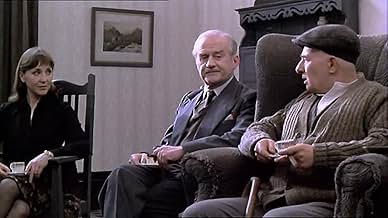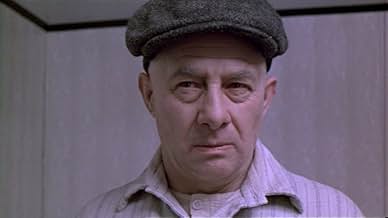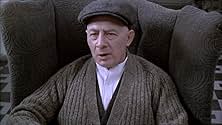Füge eine Handlung in deiner Sprache hinzuIn a dreary North London flat, the site of perpetual psychological warfare, a philosophy professor visits his family after a nine-year absence, and introduces the four men, father, uncle, an... Alles lesenIn a dreary North London flat, the site of perpetual psychological warfare, a philosophy professor visits his family after a nine-year absence, and introduces the four men, father, uncle, and two brothers, to his wife.In a dreary North London flat, the site of perpetual psychological warfare, a philosophy professor visits his family after a nine-year absence, and introduces the four men, father, uncle, and two brothers, to his wife.
- Nominiert für 1 BAFTA Award
- 1 Gewinn & 1 Nominierung insgesamt
Empfohlene Bewertungen
At first the dialogue in Harold Pinter's play, little changed for this American Film Theatre production, seems arbitrarily elliptical and the characters' behavior perversely unmotivated, but the thing is so compelling that we realize there must be something more. There is a mad method to the characters' madness. The actors know what their characters are up to. Pinter knows what they're up to. They just don't hand us all the answers on a platter. Maybe Pinter is saying something about families and maybe he's saying something about women, but I think he simply created a set of very real characters and let them do their thing without bothering with a lot of explanations.
The director, Peter Hall, does a good job at staying out of the play's way. His camera does a few clumsy things that draw attention to itself, but mainly he gives the play the space to be what it is. This movie proves yet again that the confined space of a play can often be an advantage on the screen and doesn't necessarily need to be opened up.
A few of the other commentators have questioned whether it works as a piece of 'cinema'. But with writing and acting this vital and rich the query becomes redundant. It's a filmed record of a stage play in which color and framing are used to provide texture and ambiance for the text. The absence of any unnecessary cinematic flourishes contributes to the stark, claustrophobic atmosphere.
I would argue that the piece is more effective here, atmospherically speaking at least, than it ever could be on stage. The screen filling close-ups, slow fades to black, and subtle, almost imperceptible camera movement all add the palpable sense of entrapment, tension and menace.
The performances are all majestic. But my favourite is the astonishing one given by the wonderful Vivien Merchant. Her work in this and Sidney Lumet's 'The Offence' (in the same year) stand, for me, as being amongst the greatest performances given on screen by any actor. Ever. She can switch from poignantly lost and alone, to ironic, to chillingly manipulative with a glance. Whilst always radiating an almost heartbreaking aura of emotional privation and defeat. Her premature death was a genuine tragedy.
Am I alone in finding such a spare, bleak work so strangely comforting, even uplifting? I hope not.
Yes, it is Pinter at his peak, and most of the cast knew the play well (the new cast members probably only added freshness) from done long runs years before. Having seen most of them, I would say this must surely be the jewel in the AFT crown. Unlike the Pinter directed "Butley" it has grown rather than diminished by the years.
This is one of those film plays (Glengarry Glen Ross may be another) does commit the crime of doing the play so well that it pretty much makes further productions useless. The film of "The Caretaker" done some years earlier is also very strong.
Wusstest du schon
- WissenswertesSir Ian Holm won the 1967 Tony Award (New York City) for Supporting or Featured Actor in a Drama for "The Homecoming" as Lenny. He reprised the role in this movie.
- Zitate
Max: Mind you, she wasn't such a bad woman. Even though it made me sick just to look at her rotten stinking face, she wasn't such a bad bitch. I gave her the best bleeding years of my life, anyway.
Lenny: Plug it, will you, you stupid sod, I'm trying to read the paper.
Max: Listen! I'll chop your spine off, you talk to me like that! You understand? Talking to your lousy filthy father like that!
Lenny: You know what, you're getting demented.
- VerbindungenReferenced in Jake's Progress (1995)
Top-Auswahl
- How long is The Homecoming?Powered by Alexa
Details
- Erscheinungsdatum
- Herkunftsländer
- Sprache
- Auch bekannt als
- Harold Pinter's The Homecoming
- Drehorte
- Hackney, London, Greater London, England, Vereinigtes Königreich(outside scenes)
- Produktionsfirmen
- Weitere beteiligte Unternehmen bei IMDbPro anzeigen
- Laufzeit
- 1 Std. 51 Min.(111 min)
- Sound-Mix
- Seitenverhältnis
- 1.78 : 1



